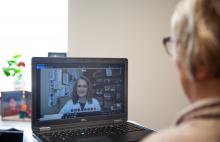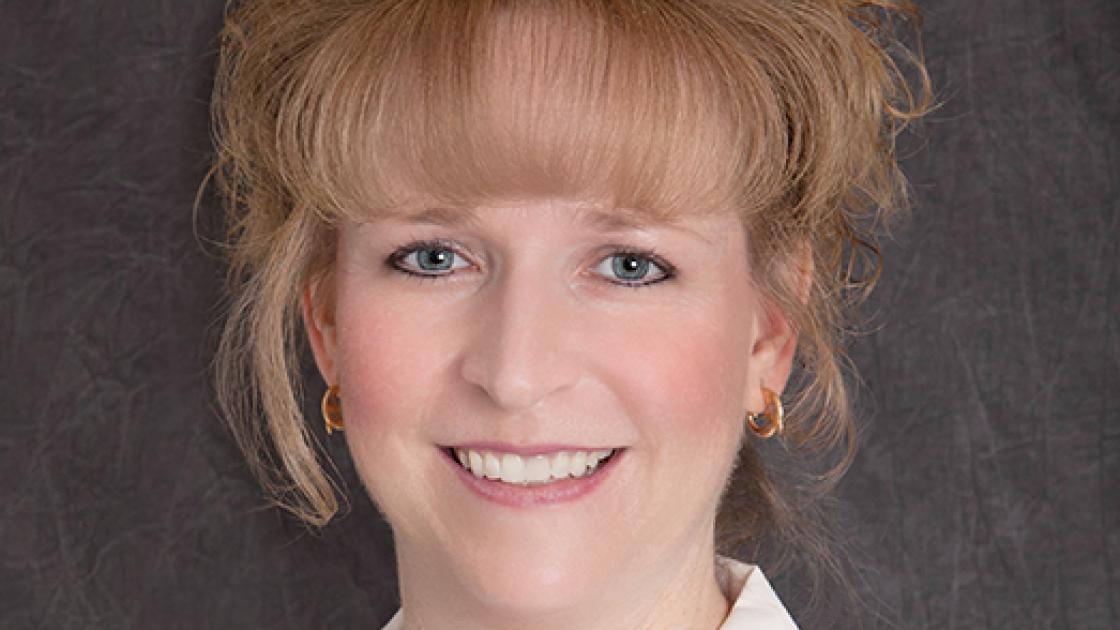
A Virtual Success Story: Telepsychiatry
SIU Psychiatry was an early adopter of telehealth, with Jeffrey Bennett, MD, establishing a clinical training program for residents within critical access hospitals in 2008. Considering it a “future in the field,” Psychiatry Chair Kari Wolf, MD, expanded telepsychiatry to give residents greater exposure to telemedicine during the past decade. She sought out partnerships to increase access and broaden the learner experience. By 2018, residents were seeing patients virtually in Illinois prisons, the Macon County Jail, group homes for people with intellectual disabilities, and in other hospitals.
When the pandemic struck, the department was prepared. Administrators were able to convert outpatient visits into telemedicine appointments within a week. Faculty training was minimized because many had already covered telemedicine rotations for Wolf and Bennett.
We asked Dr. Wolf about telepsychiatry’s growing popularity and functionality.
What do you see as advantages to a telehealth patient visit?
In a word, access. It’s a real convenience factor for the patient. This is the third institution where I’ve used telemedicine. I’ve served in rural areas where people would have to get in their cars and drive several hours to see me. I’ve done it in urban areas where people don’t have reliable transportation. They would have to take three buses and a half-day off work to come across town to see me. I’ve done telemedicine in schools so kids don’t have to miss as much school and parents don’t have to miss part of their workday to pick up their children and drive them to the doctor’s office.
Another advantage is that it has greatly reduced the number of no-shows that we used to get with in-person visits. I’ve had people go out to their cars on a break from work and connect with me on their smartphones for a telemedicine appointment, so they don’t miss any of their work or paycheck. I’ve had professionals log into the telemedicine platform from their office computers to connect for their appointment. While all of these venues improve access and convenience for the patient, they also help to overcome stigma. Friends, co-workers, and even family members don’t know they’re seeing a psychiatrist and no one sees them walk into the psychiatry clinic.
From the physician's standpoint, it increases capacity. Time previously spent commuting to a satellite location is now spent seeing patients. Me or one of my team who had been driving two hours round-trip to Jacksonville or Decatur are now seeing four to six more people a day. Or we’re doing research, or teaching, or providing service – something more constructive for the medical school and the community.
Another advantage: for patients with impaired mental functioning – dementia, a child with severe autism or intellectual disability – being able to see them in their home environment helps you get a better understanding of how they are actually functioning. If they have to be brought into the clinic it involves travel, checking in, waiting, getting vitals, and a lot of extra commotion that can make them uncomfortable. In clinic I’d have to interpret what the parent or caregiver is saying and how that affects the patient. Observing them in their home setting, I can often see the family dynamic unfold on the screen in real-time and see ways in which the patient is functioning well as well as what challenges they are facing. Are there any notable disadvantages?
The physician controls the camera in virtual telemedicine visits using traditional telemedicine platforms, so they can see nearly everything as they would observing the patient’s body language in person. However, when it’s done through WebEx, it’s more limited. You’re at the mercy of their device — we can’t control the camera to zoom in or out.
can see nearly everything as they would observing the patient’s body language in person. However, when it’s done through WebEx, it’s more limited. You’re at the mercy of their device — we can’t control the camera to zoom in or out.
Establishing ground rules with the patient is important. It’s mostly about raising awareness. You can’t have them taking their doctor’s appointment on their phone while they’re checking out at the grocery store. It has to be conducted professionally. We need your full attention, just like we would in a face-to-face clinic visit, to serve you in the way that’s going to be best for your health.
Tell me about the telepsychiatry treatment options available to Illinois’s incarcerated population.
I was approached by Interim Director of the Illinois Department of Corrections, John Baldwin, to have SIU assume care at a couple of the prisons. The program started in the summer of 2018, and it’s expanded into the present DOC arm. This clinic serves several purposes. First, it aligns with our mission to provide high-quality care to a vulnerable population. It also serves as a tremendous learning opportunity for psychiatry residents. Prisons serve as the largest mental health system in the United States. This means that many of the patients we see in the hospitals and in the community have had interactions with the criminal justice system at least once in the past.
I think many psychiatrists (and people in general) think that people who are incarcerated are bad people or at least have made the conscious decision to do something bad. The experience our residents get within Pontiac and Logan Correctional Centers is designed to break down that stereotype. When residents hear the awful lives that our patients have experienced leading up to their incarceration, one begins to understand how that person ended up in prison. The amount of trauma our patients have experienced is unfathomable, and we know the detrimental effects trauma has to one’s health and mental health. I often say to a resident who has just completed a new patient evaluation, “Hearing that patient’s story, I think I would be in his/her shoes right now had I been born into his/her life.” That creates compassion and empathy for this population that many physicians have never had the opportunity to develop.
Likewise, when the residents learn about the lack of or suboptimal psychiatric care our patients have received throughout their lives, it becomes a first-hand experience in how broken the mental health system is in the U.S. I remind the residents that they will soon be graduating and become experts in mental health — ones who friends and policy-makers will ask them how to make better systems and programs. This experience helps them see the problems as well as potential solutions. And, finally, it helps residents learn what these patients need to be successful in life — both how to function during their remaining incarceration as well as how to lead successful lives once they are released from prison.
What are some challenges facing telemedicine in the future?
The long-term status of Medicare support for telehealth is unknown. It could expire, leaving a portion of the population without access to it.
If the Ryan Haight Act gets reinstated, that’s a problem. [The act imposes rules requiring practitioners who use telepsychiatry to conduct an in-person medical evaluation, with certain specified exemptions, before prescribing a controlled substance to a client.] We are treating patients in Chicago as well as from Southern Illinois who wouldn’t be able to commute for these appointments. They would lose their care.
The lack of broadband in some rural communities is another limiting factor. I’m working with Laura (Kessel) on the Lieutenant Governor’s Rural Affairs Council to encourage the development of broadband hubs in these towns. It could be a room in an existing medical clinic, a school, a library, a county office, a family resource center – somewhere with sufficient broadband available to give the community members a chance to see a specialist virtually and improve their health. We are launching a pilot project for it later this year.



